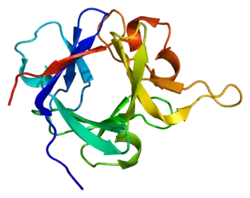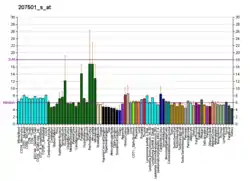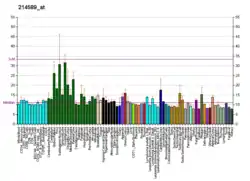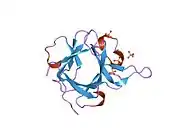FGF12
Fibroblast growth factor 12 is a protein that in humans is encoded by the FGF12 gene.[5][6][7]
The protein encoded by this gene is a member of the fibroblast growth factor (FGF) family. FGF family members possess broad mitogenic and cell survival activities, and are involved in a variety of biological processes, including embryonic development, cell growth, morphogenesis, tissue repair, tumor growth, and invasion. This growth factor lacks the N-terminal signal sequence present in most of the FGF family members, but it contains clusters of basic residues that have been demonstrated to act as a nuclear localization signal. When transfected into mammalian cells, this protein accumulated in the nucleus, but was not secreted. The specific function of this gene has not yet been determined. Two alternatively spliced transcript variants encoding distinct isoforms have been reported.[7]
References
- GRCh38: Ensembl release 89: ENSG00000114279 - Ensembl, May 2017
- GRCm38: Ensembl release 89: ENSMUSG00000022523 - Ensembl, May 2017
- "Human PubMed Reference:". National Center for Biotechnology Information, U.S. National Library of Medicine.
- "Mouse PubMed Reference:". National Center for Biotechnology Information, U.S. National Library of Medicine.
- Smallwood PM, Munoz-Sanjuan I, Tong P, Macke JP, Hendry SH, Gilbert DJ, Copeland NG, Jenkins NA, Nathans J (Oct 1996). "Fibroblast growth factor (FGF) homologous factors: new members of the FGF family implicated in nervous system development". Proc Natl Acad Sci U S A. 93 (18): 9850–7. doi:10.1073/pnas.93.18.9850. PMC 38518. PMID 8790420.
- Liu Y, Chiu IM (Nov 1997). "Assignment of FGF12, the human FGF homologous factor 1 gene, to chromosome 3q29-->3qter by fluorescence in situ hybridization". Cytogenet Cell Genet. 78 (1): 48–9. doi:10.1159/000134625. PMID 9345906.
- "Entrez Gene: FGF12 fibroblast growth factor 12".
Further reading
- Robertson NG, Khetarpal U, Gutiérrez-Espeleta GA, et al. (1995). "Isolation of novel and known genes from a human fetal cochlear cDNA library using subtractive hybridization and differential screening". Genomics. 23 (1): 42–50. doi:10.1006/geno.1994.1457. PMID 7829101.
- Kok LD, Tsui SK, Waye M, et al. (1999). "Cloning and characterization of a cDNA encoding a novel fibroblast growth factor preferentially expressed in human heart". Biochem. Biophys. Res. Commun. 255 (3): 717–21. doi:10.1006/bbrc.1999.0178. PMID 10049777.
- Schoorlemmer J, Goldfarb M (2001). "Fibroblast growth factor homologous factors are intracellular signaling proteins". Curr. Biol. 11 (10): 793–7. doi:10.1016/S0960-9822(01)00232-9. PMC 3216481. PMID 11378392.
- Liu CJ, Dib-Hajj SD, Renganathan M, et al. (2003). "Modulation of the cardiac sodium channel Nav1.5 by fibroblast growth factor homologous factor 1B". J. Biol. Chem. 278 (2): 1029–36. doi:10.1074/jbc.M207074200. PMID 12401812.
- Strausberg RL, Feingold EA, Grouse LH, et al. (2003). "Generation and initial analysis of more than 15,000 full-length human and mouse cDNA sequences". Proc. Natl. Acad. Sci. U.S.A. 99 (26): 16899–903. doi:10.1073/pnas.242603899. PMC 139241. PMID 12477932.
- Olsen SK, Garbi M, Zampieri N, et al. (2003). "Fibroblast growth factor (FGF) homologous factors share structural but not functional homology with FGFs". J. Biol. Chem. 278 (36): 34226–36. doi:10.1074/jbc.M303183200. PMID 12815063.
- Ota T, Suzuki Y, Nishikawa T, et al. (2004). "Complete sequencing and characterization of 21,243 full-length human cDNAs". Nat. Genet. 36 (1): 40–5. doi:10.1038/ng1285. PMID 14702039.
- Popovici C, Conchonaud F, Birnbaum D, Roubin R (2004). "Functional phylogeny relates LET-756 to fibroblast growth factor 9". J. Biol. Chem. 279 (38): 40146–52. doi:10.1074/jbc.M405795200. PMID 15199049.
- Gerhard DS, Wagner L, Feingold EA, et al. (2004). "The status, quality, and expansion of the NIH full-length cDNA project: the Mammalian Gene Collection (MGC)". Genome Res. 14 (10B): 2121–7. doi:10.1101/gr.2596504. PMC 528928. PMID 15489334.







